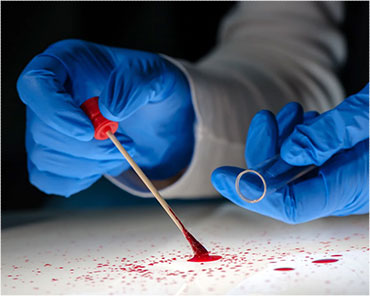One night in 1985, a white man walked into an African American church in southeast Georgia and fatally shot a beloved couple. For decades, DNA evidence found at the crime scene didn’t match that of any of the suspects who were tested — until now.
Erik Sparre, a suspect whom police dropped from their investigation in 1986 based on his alibi, is a match, according to a new court filing by the Georgia Innocence Project and the King & Spalding law firm. The lawyers, working for the man convicted of the murders, decided to do the test after learning that reporting by The Atlanta Journal-Constitution uncovered problems with Sparre’s alibi.
The test compared DNA taken from Sparre’s mother to DNA in hairs stuck in the hinge of a pair of glasses found near the bodies. The results show that the hairs in the glasses belonged to someone from Sparre’s maternal line, the Tuesday court filing says. “The new DNA evidence is critically significant because it for the first time provides reliable forensic physical evidence linking a known suspect, Erik Sparre, to physical evidence at the crime scene, the glasses,” the lawyers wrote.
Dennis Perry, the man imprisoned nearly 20 years for the crime, has never been linked to the crime by physical evidence and has maintained his innocence. A DNA test before his trial showed he did not match.
The DNA match with Sparre comes after decades of investigation by police, prosecutors, lawyers and journalists. The case has been the subject of a podcast and an episode of TV’s “Unsolved Mysteries.” It has sown grief and division in Camden County and among law enforcement officers. At least three detectives who worked the case have long believed that Perry is innocent.
Sparre was considered a suspect early on because he told an ex-wife that he committed the crime, according to records in the 6,000-page case file. Her family played for police a recording in which a man they said was Sparre said he murdered the couple. It isn’t clear what happened to the tape. It isn’t stored with the case file. Much of the evidence in the case has gone missing.
A spokeswoman for the GBI said the agency is aware of the DNA match. “At this time, we are evaluating what further actions will be taken,” said Nelly Miles.
Perry’s motion for new trial, which is before Glynn County Superior Court, argues that Perry likely would’ve never been tried if the DNA results were available before. The filing posits that Sparre likely would’ve been investigated because the DNA test shows a connection between him and the only DNA in the case.
Perry, 58, hopes to finally be set free.
“Before, I had hope. But now, with this DNA out there, I almost feel like a free man already,” Perry said in a statement. “I’ve just got to wait for the courts to do the right thing.”
To read the full original article from the AJC, please click here.
Please contact us about your case or legal matter by clicking here.

